Will Cognitive Behavioral Therapy be Effective for my Anxious Teen?

Cognitive behavioral therapy is considered the gold standard of therapeutic practices for recovery from addictions and mental health issues. Many teens and adolescents who are seeking treatment for addiction are experiencing secondary, co-occurring mental health disorders like an anxiety disorder. Numerous research studies are emphasizing that teens' chronic interaction with technological devices and social media platforms is contributing to their declining mental health. Children, adolescents, and teens today are experiencing anxiety in a way that is alarming mental health professionals. Experiencing mental health struggles increases the risk of substance abuse and vice versa. Finding the most effective therapeutic interventions is the best guarantee toward empowering teens to recover by equipping them with tools for managing mental health. Cognitive behavioral therapy is considered to be one of the most effective therapeutic approaches to teens' mental health and addiction.
In 2017, the
Journal of Anxiety Disorders
published a study on the efficacy of cognitive behavioral therapy for long term results in youth with anxiety disorders. Four years after treatment, youth in the study continued to see improvements. Nearly 140 children with a mean age of 15.5 years old were treated with cognitive behavioral therapy and assessed longitudinally. Youth participants in the study were living with either separation anxiety disorder, social anxiety disorder, and/or generalized anxiety disorder. At the long-term follow up assessment after about four years, more than half of the participants no longer met the diagnostic criteria for anxiety disorders of any kind. More than 60% of the participants no longer met the criteria for their originally diagnosed anxiety disorder. These findings are impressive and comforting for parents of teens and adolescents who are struggling with anxiety.
Therapy you can trust
Cognitive behavioral therapy is utilized in addiction treatment because of its goal-oriented approach. Rather than a discovery process, like traditional talk therapy, cognitive behavioral therapy sets specific goals by targeting problematic behaviors, like addiction. Together, a therapist and their patient look at what kind of thought processes encourage addiction behaviors, then examine where those thought processes came from. Patients realize that their thoughts don't simply happen. Realizing that their thoughts and decisions are autonomous, patients are empowered to radically transform their thinking. As a result, problematic thought patterns are interrupted, allowing teens to make better decisions, like abstaining from drugs and alcohol.Stonewater Adolescent Recovery Center offers long term residential treatment programs for addiction recovery. Our programs involve the whole family for foundation building, life cleansing change.
Call us today to start living your recovery: 662-598-4214

.jpg)

